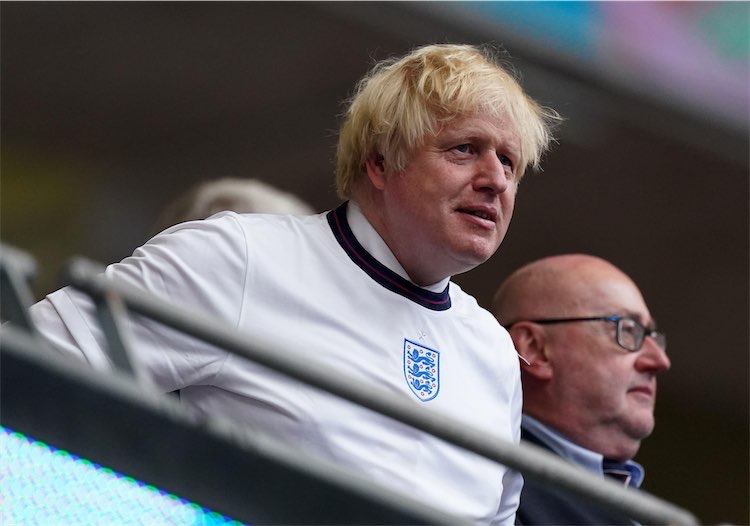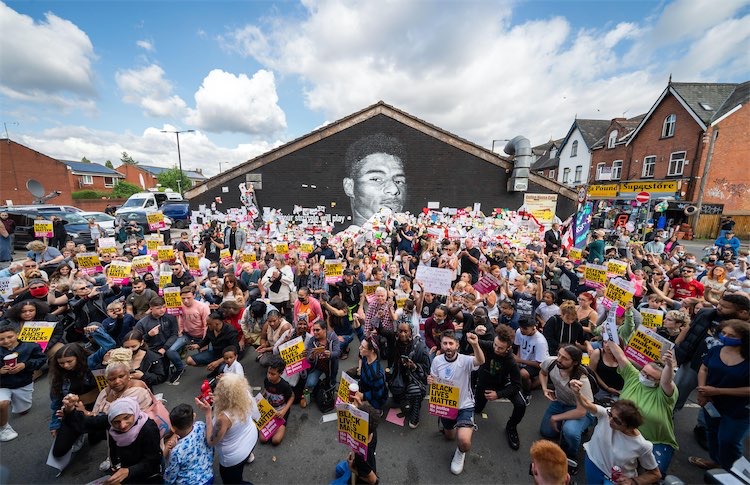The Saturday View: How The Culture War Backfired On The Tories
9 min read
“I do not want to engage in a political culture war of any kind." Those were the words of Boris Johnson at Prime Minister’s Questions this week, after a bruising few days for his party off the back of the row kicked up by the England football team’s defeat in the final of Euro 2020.
His declaration was undermined somewhat by one of his Conservative colleagues heckling the words “Labour member” at the mere mention of defender Tyrone Mings from across the chamber in the same session. There is no evidence he is a member of the party.
Whether Johnson wants to directly engage in a culture war or not, his fellow Tories have been more than willing to dive headlong into a range of hot button topics in the past year; anything from debates about removing statues to what songs are played at the Proms, Ben and Jerry’s ice cream, and a seemingly never-ending row about the British flag.
As the senior backbencher John Hayes said in a debate on a bill covering free speech on campus: “Make no mistake: this culture war is the issue of our age. It is the struggle of our generation. Nothing matters more. This is our battle of Britain.”
While they have undoubtedly been successful at winning over socially conservative Labour voters by employing so-called “wedge” politics, this week they found themselves on the wrong side of public opinion. It has led to prominent members of the party now calling for a re-think on the culture wars.
Their message to take care in the culture wars was reinforced at the end of the week, when the “anti-woke” news channel GB News went into meltdown after it sanctioned a contributor for taking the knee live on air – at least one senior member of staff has resigned and more are set to follow.
One Tory MP told PoliticsHome the issue is “Number 10 are obsessed with ‘what does the Red Wall think'. And I think there is a danger emerging in the minds of some that there's this kind of caricature of a Red Wall voter, perhaps there is some bloke who sits in a pub raging against people on benefits, raging against overseas aid, raging against black footballers taking the knee in an England shirt.
“And I think we do need to be careful we're not creating this kind of condescending view of a red wall voter and which takes us into wrong conclusions.”
A former Cabinet minister said: “I think a lot of people in my party thought England would romp to victory and [it would be] a great moment of national celebration and there would be a fantastic reception at Downing Street, what a great feel-good moment on the back of the vaccination programme that the Conservative government could even indirectly be associated with.
“And of course, it hasn't worked out like that at all. It's been a big cultural moment, but one when the country's reflected on all kinds of issues; race, the fallout from some of the hooligan behaviour on Sunday night, social media.
“And in the midst of all of that, we kind of looked a bit like we've been caught in the headlights.”

It is understood a lot of the push on Cabinet ministers to speak out on these issues comes from within Number 10, and the influential figure of Douglas Smith, said to be behind culture secretary Oliver Dowden’s move to engage on otherwise niche subjects like the suspension of England cricketer Ollie Robinson over tweets he made as a teenager.
Smith, married to Munira Mirza, a longtime Johnson ally and his policy director, is said to be a key figure in shaping the party’s narrative on cultural issues, as well as controlling access to the Conservative candidates’ list and pushing appointments to public bodies, as the former director of Downing Street communications Alastair Campbell claimed this week, adding “they completely misjudged the mood.”
A former party adviser agrees: “They react too quickly to things. They’ve made a calculated decision to be anti-woke but there are graduations within that and there are nuances and the problem is most people don’t see the nuances of taking the knee and why it means different things to different people so you rise above it.
“This whole thing about ‘we don’t do gesture politics’, is also bollocks. Wearing a poppy is a gesture, handing people a leaflet is a gesture, politicians do most of what they do about gestures.
“Boris Johnson with the huge England flag on Downing Street, that was a brilliant gesture, but nonetheless a gesture and a stunt that created brilliant pictures. Politics is all about gestures and symbolism.”
Mings had criticised the home secretary Priti Patel after she condemned the abuse his Black teammates had received after missing in the penalty shootout against Italy, despite earlier saying fans had a right to boo those who took the knee.
Johnson eventually said he disapproved of fans booing the gesture (after his spokesperson had said they had the right to do so) and backed the team, but by that point backbench Tory MPs had already gone much further; Brendan Clarke-Smith comparing taking the knee to British footballers performing a Nazi salute during a 1938 match against Germany in Berlin.
Lee Anderson infamously declared he would stop watching the team play while they continued to take the stand and was ridiculed by the media and Labour, who sent a billboard to his Ashfield constituency calling on him to continue his boycott because England were playing so well without his support.
“Some of my colleagues thought that they were well and truly on the right side of public opinion by going so far out in public with criticising the England team,” one Tory MP said.
“And I think obviously the events during the course of the tournament and the public support for the players proved that was very wrong.”
They described some of his colleagues’ opposition to the England team taking the knee as being drawn from issues stretching back to the Black Lives Matter protests last summer, the targeting of statues and the public order offences that went with it, and failed to separate out the specific stance of the national team players, and the unique level of support they enjoy.
A Conservative commentator said: “I don't believe any Conservative politician should want players to stop taking the knee, to cancel themselves in response to politicians criticising them because that would be a diminution of free speech.
“So it felt to me just a very short-sighted approach to a very salient political issue as England were entering a major tournament, one that politicians were never going to win.”

One MP told PoliticsHome their colleagues should have seen this coming, after repeatedly getting outflanked by England striker Marcus Rashford and his free school meals campaign last year.
Latent ill-feeling towards the Manchester United star was evident in backbencher Natalie Elphicke messaging a Conservative whatsapp group suggesting after his penalty miss he should have spent more time "perfecting his game" rather than "playing politics”.
She has since apologised, proving once again there is little value in criticising a national hero.
A former Conservative Party special adviser explained: “Getting into any sort of argument with the England football team is mad.
“Don’t ever get into a row with national heroes. Don’t ever get into a row with David Attenborough, don’t ever get into a row with the English football team. Who’s next? Are you going to criticise Joanna Lumley?
“Stop getting into rows over things that can be completely foreseen that it will be a political problem down the line.”
A senior Conservative also said by opposing England’s stance on the knee they have missed a chance to align themselves with the value the team has espoused.
“They’re a decent group of young men wearing their national shirt with pride espousing values that seem to show compassion and humility, that's a hell of an attractive thing for what should be our brand of conservatism,” they said.
Echoing a line from Johnson’s “levelling up” speech on Thursday they added: “If we could bottle that as a party, and put that as our secret ketchup formula, that's something really of value.”
There has also been criticism the focus on cultural issues has been a substitute for policy, Will Tanner from the Onward think tank said: “Culture is becoming more important in our politics, and when you poll people there is absolutely no doubt that cultural issues are becoming more salient and it's driving voting behaviour, so currently, and certainly at the last election, I think it'd be wrong to say that culture isn't important.
“I think the kind of question is what do we mean by culture, and I think it's a bit of a cul de sac and a trap, politically, to constantly kind of chase after fights, to cross the road to pick a fight about certain kinds of niche, progressive debates that largely happen on Twitter and don't happen out in the real world, and I do think that that could lead to some, some bad political consequences.
“But what I do think the government should be doing, and needs to do to respond to what comes from the cultural questions is to just have a very clear sense of its own values and to project those values in a really clear and articulate way.”
He added: “And naturally if you just go back to the England football team from the last six weeks, what Gareth Southgate did very effectively wasn't by defining himself against other people's values - it was telling people what he stood for, this kind of moderation, humility, delivering on the pitch and standing up for social issues off it, not by defining himself in opposition to others.
“And I think that for me that's the big question with the culture wars - are you doing it just to undermine other people's position and pick a fight, or are you doing it to protect your own values?
“I think it's the latter that voters are seeking.”
Additional reporting by Kate Proctor
